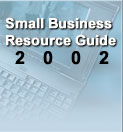 |
| |
| |
| |
| |
| |
| |
| |
| |
| |
| |
| |
| |
| |
| |
| |
|
Filing Your Return(s) and Paying TaxesFederal Tax Deposits (FTD)In general, you must deposit income tax withheld and both the employer and employee social security and Medicare taxes (minus any advance EIC payments) by mailing or delivering a check, money order, or cash to an authorized financial institution or Federal Reserve bank. However, some taxpayers are required to deposit by electronic funds transfer. When To Deposit Electronic Federal Tax Payment System
(EFTPS) Making Deposits With FTD Coupons. If you are not making deposits by EFTPS, use Form 8109, Federal Tax Deposit Coupon, to make the deposits at an authorized financial institution or Federal Reserve bank. For new employers, the IRS will send you a Federal Tax Deposit (FTD) coupon book 5 to 6 weeks after you receive an employer identification number (EIN). (Apply for an EIN on Form SS 4.) If you do not receive your resupply of FTD coupons, call 1-800-829-1040. It is very important to clearly mark the correct type of tax and tax period on each FTD coupon. Importance of Timely Deposits If you do not timely pre-pay your tax using deposit coupons or if you were not required to make any deposit and/or did not include your payment when you filed your return, we will charge you interest and penalties on any unpaid balance. We may charge you penalties for not depositing employment taxes timely up to 14% of the amount not deposited, depending upon how many days late you make the deposit. If you do not pay withheld trust fund taxes, we may take additional collection action.
To encourage prompt payment of withheld income and employment taxes, including Social Security and railroad retirement taxes or collected excise taxes, Congress passed a law that provides for the trust fund recovery penalty. This penalty is used as a tool for collection of unpaid employment taxes. The penalty also applies to those excise taxes which are commonly referred to as collected excise taxes. If you are a responsible person, we can apply this penalty against you immediately after you do not pay trust fund taxes in response to a notice and demand for payment. Also, we can apply this penalty regardless of whether you are out of business or without assets. Caution: Once we assert the penalty, we can take collection action against your individual assets, such as filing a Federal tax lien if you are the responsible person(s).
|